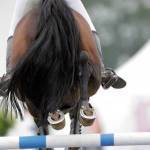Chondroitin Sulfate and Glucosamine Effective Against Equine Osteoarthritis

No matter the discipline, osteoarthritis looms as a menace for performance horses. Many horse owners use nutritional supplements, such as chondroitin sulfate and glucosamine, to treat and prevent osteoarthritis, but the effectiveness of oral products remains unclear. Researchers at the University of São Paulo in Brazil investigated the progression of osteoarthritis in horses to measure the efficacy of chondroitin sulfate and glucosamine supplementation.
For this study, the researchers selected 16 sound, healthy mares with normal fetlock joints based on flexion tests, radiographs, and ultrasound examinations. They surgically induced osteoarthritis in one fore fetlock joint of each mare. Mares were then separated into two groups: those in the treatment group were given a chondroitin sulfate/glucosamine/MSM powder every 12 hours in their feed for 90 days after the surgery, and mares in the control group were not given the compound.
All horses were evaluated 30, 60, 90, and 120 days after surgery for lameness. The researchers assessed all lamenesses using the system provided by the American Association of Equine Practitioners, which includes a range of scores from 0 (no lameness) to 5 (minimal or no weight-bearing), and lameness was further measured using motion-sensor software. Researchers also recorded joint angles during the physical examination. Ultrasonographic and radiographic examinations and collection of synovial fluid for biomarker assessment were performed at these same time points. At the end of the study, researchers used arthroscopy to evaluate joints and collect samples for histopathologic analysis.
In sum, according to the researchers, “Significant differences were observed between groups in some evaluated parameters, such as visual lameness assessment, synovial concentrations of prostaglandin E2, and ultrasound examination. However, the treatment group still presented slightly improved (a nonsignificant trend) results for joint flexion angle, analysis of lameness using sensors, and histopathological analysis of chondral tissue repair.”
“Without question, osteoarthritis remains a significant problem for horses involved in athletic endeavors and, as the disease advances, is often cited as the reason performance horses can’t perform to their potential, must step down in exercise intensity, or retire from sport altogether. Preventing arthritis is also a significant horse welfare consideration as horses are being ridden and living longer,” said Peter Huntington, B.V.Sc., M.A.C.V.Sc., a veterinarian and director of nutrition at Kentucky Equine Research.
The results of this study support the use of joint supplements that contain chondroitin sulfate, glucosamine, and MSM. When choosing nutritional supplements, select products from reputable manufacturers that use high-quality ingredients, meaningful active ingredient levels, and proven formulations.
*Yamada, A., C. do Prado Vendruscolo, M.F. Marsiglia, E. Sotelo, F.R. Agreste, S. Seidel, J. Fülber, R. Baccarin, and L. da Silva. 2022. Effects of oral treatment with chondroitin sulfate and glucosamine in an experimental model of metacarpophalangeal osteoarthritis in horses. BMC Veterinary Research 18:215.








